‘Music is hope’: A German band takes an American swing at the coronavirus
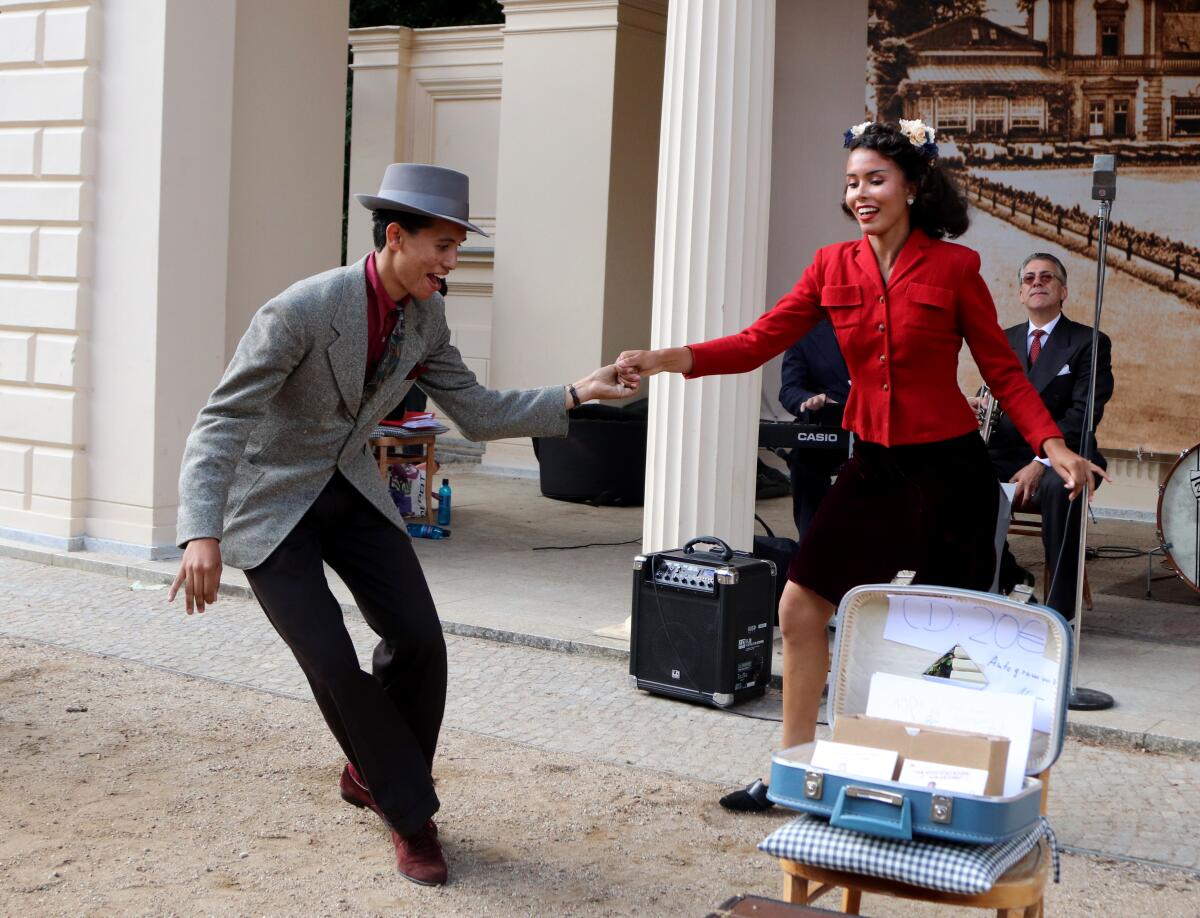
- Share via
BERLIN — Andrej Hermlin was pounding his heart out on the piano, playing with a swing-dance orchestra through what he feared might be his last-ever concert March 14. The coronavirus was rapidly spreading dread across Europe, all his forthcoming gigs had just been canceled and his future looked bleak.
“I started crying, crying like a baby during that show, because I thought that was the end of it and I’d never play another concert ever again,” said Hermlin, 54. “I thought this was going to be the end of the entertainment industry, the end of music, and I just couldn’t stop crying.”
But instead of wallowing in sorrow, the well-known German big band leader decided to tap into the same Depression-defying spirit of the 1930s music that has become the substance of his life and livelihood. Just one day after his last appearance on stage, Hermlin launched a nonstop series of nightly concerts of American big band tunes livestreamed from his living room to thousands of followers around the world.
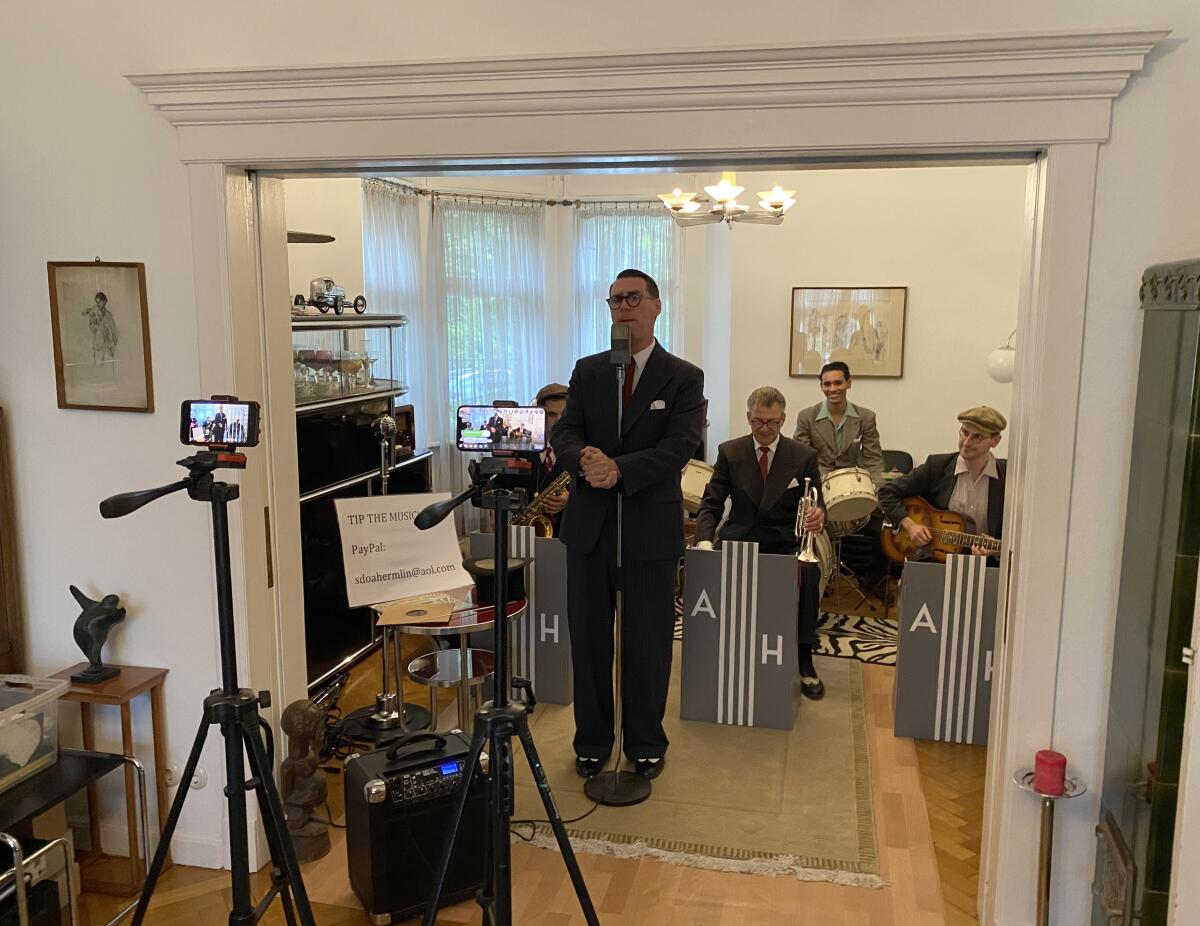
Hermlin, who with his greased-back hair and black-rimmed glasses bears more than a passing resemblance to Clark Kent, vowed that he and the six other members of the Swingin’ Hermlins would not stop their performances of upbeat pieces from the likes of Benny Goodman, Duke Ellington and Glenn Miller until the coronavirus crisis had passed — whenever that may be.
“That’s the oath that I made: We’re going to keep playing every night until this thing and all the economic upheaval it brought with it is over, too,” Hermlin said in an interview before the band’s 118th consecutive show recently.
The performances start at 7 p.m. in Berlin and last about 30 to 40 minutes. Fifteen hundred to 15,000 people from dozens of countries around the world — including fans in Los Angeles, San Francisco and San Diego — have been watching the mix of toe-tapping music, sprightly dialogue and good-natured ribbing between band members on digital platforms such as Facebook Live, Instagram and YouTube. Some viewers pledge tips and donations, which have evolved into a not-unimportant source of income for musicians these days.
Hermlin, the son of well-known German author Stephan Hermlin, wears 1930s-style suits and ties both on stage and in his home, which is entirely outfitted in 1930s-style décor. He fell in love with American swing as a 3-year-old growing up in Communist East Berlin — in the same house that he lives in today — and hasn’t stopped playing those upbeat melodies since, even though he didn’t visit the U.S. until 1993 at the age of 27, four years after the fall of the Berlin Wall.
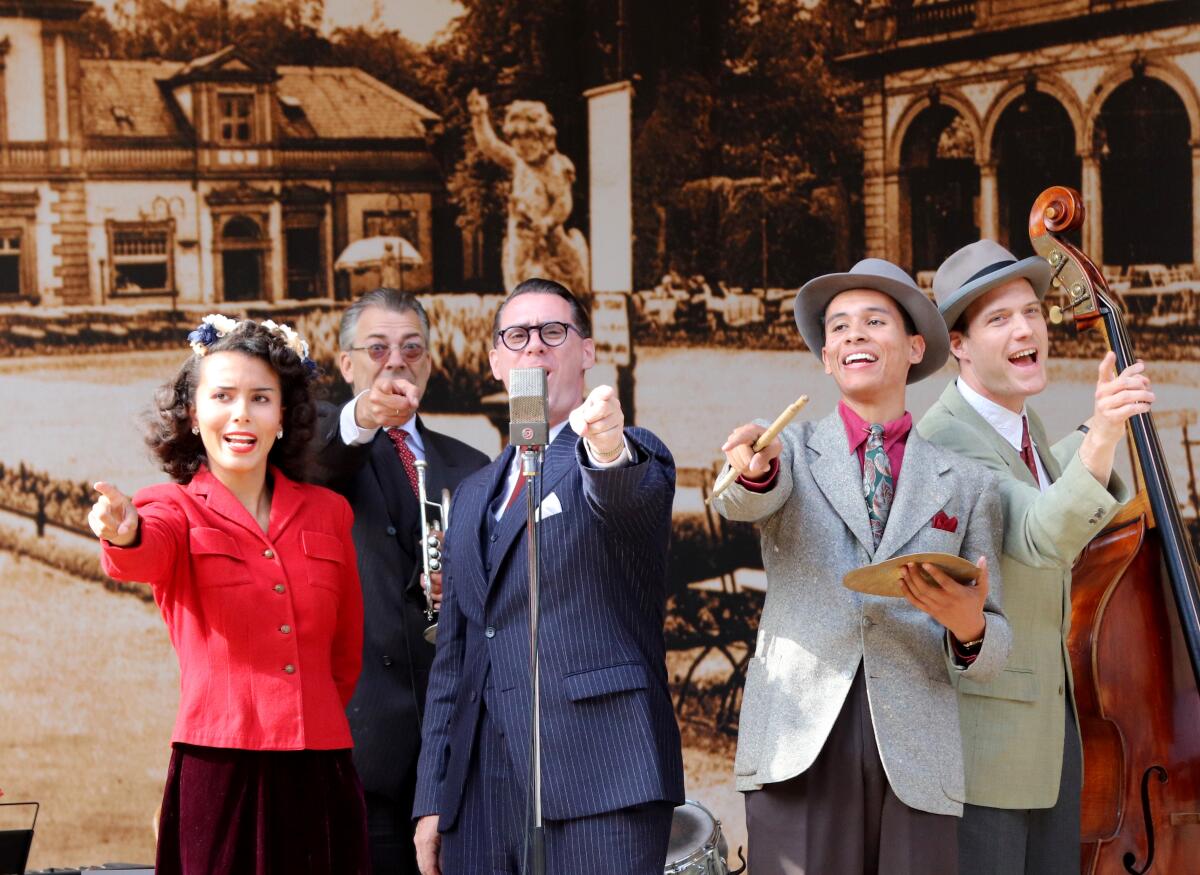
“The music is fantastic. I couldn’t live without it,” Hermlin said. “In a way it’s the perfect answer to the crisis we’re in, just like the original music in the 1930s was an answer to the Great Depression.”
Hits from that era like “We’re in the Money” and “Happy Days Are Here Again” are infused with an optimism that strikes a chord with many lockdown-weary listeners today.
“The music was a great escape for a lot of people,” said Vincent Pelote, a senior archivist at the Institute of Jazz Studies at Rutgers University, one of the world’s most important jazz archives. “It was music that made people want to get up and go dance. Dancing was a way to forget about the Depression, forget about things like bread lines and forget about their troubles.”
That goes for the musicians themselves, who are suffering amid the closure of nightclubs and concert halls because of the COVID-19 pandemic. Some have turned to online performances to get by and to try to stay connected with their audiences. Others have survived on a combination of savings, financial assistance from friends and family, and modest state support in countries such as Germany, as well as private tips and donations.
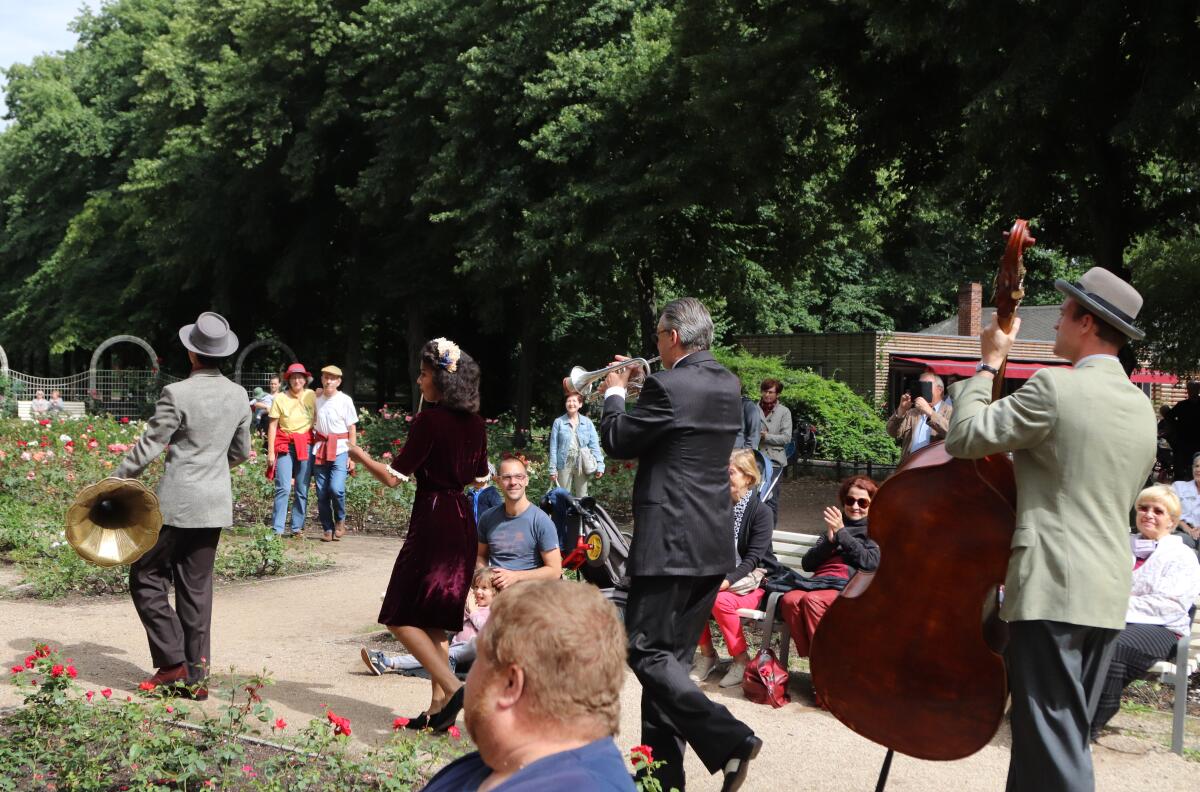
Hermlin and his band have been doing a bit of all of that. Besides his 19-year-old son David (drums and vocals) and his 16-year-old daughter Rachel (vocals), the multinational band includes Australian Jack Latimer (guitar), Frenchman Daniel Duspiwa (saxophone) and fellow Germans Joerg von Nolting (cornet) and Malte Toenissen (bass).
Several weeks ago, sorely missing in-person audiences after performing in front of a webcam for more than two months, the group began experimenting with unannounced afternoon concerts in a nearby park on weekends, as well as occasional gigs on street corners in Berlin — complete with an upturned top hat for a tip jar.
“You need to reinvent yourself,” said Hermlin, who has no qualms about performing as a street musician for the first time in his life. “Before, I played in some of the greatest places in the world: in New York at the Rainbow Room, at the Teatro Massimo in Palermo, [Italy,] at the Elbe Philharmonic Hall in Hamburg, in Israel and everywhere else. Now I’m playing in the streets. But I’m OK with that. … Actually, I’m happier now than I was before the crisis started. I’m doing what I love, playing this music and doing a lot of improvising and having a lot of fun.”
That enthusiasm is palpable among the band members, who believe that their forced pursuit of different sources of income and audiences, along with their high frequency of performances, is raising their game.
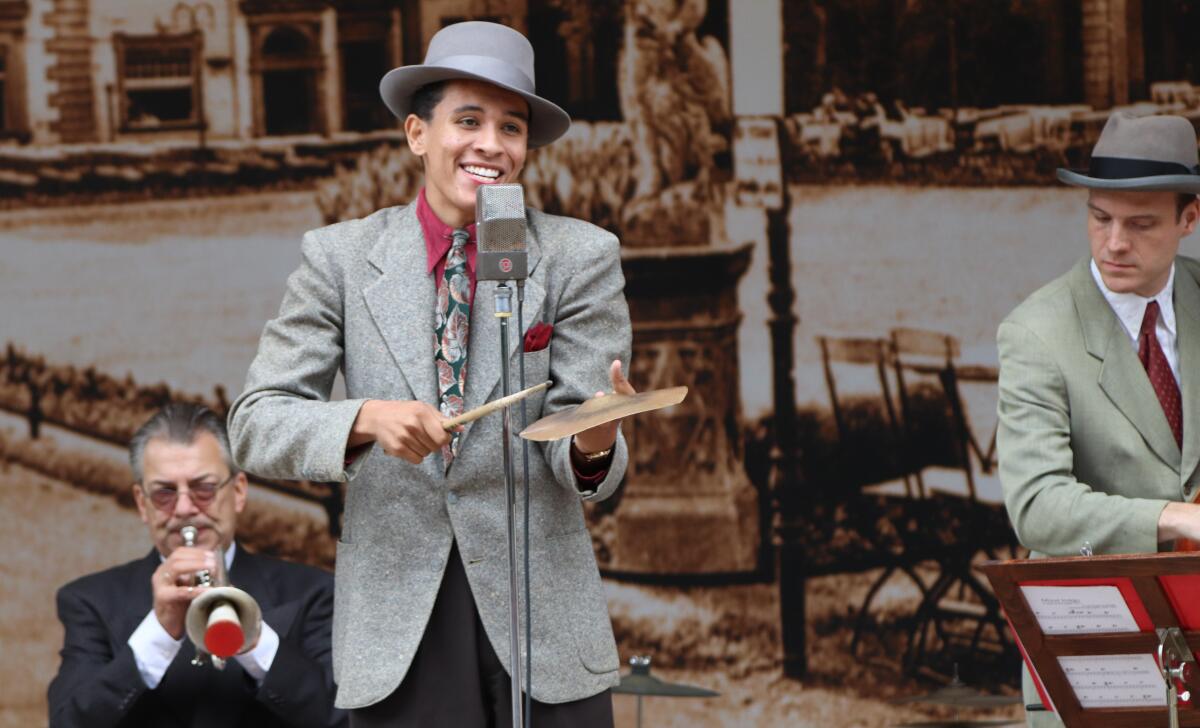
“I’ve never learned so many new songs in such a short time in my life,” said Duspiwa, referring to the requests from the audiences that the band plays every evening. “Playing every night is different from just practicing every day. You have to be really good when you’re playing. I have a feeling we’re all getting better through this.”
Duspiwa didn’t think Hermlin was serious when he vowed that the group would play every single evening for months and perhaps years to come. “I thought, ‘Oh, OK, whatever,’” he said. “But you know, we’re really enjoying this, and we’ll see where it takes us. It at least gives us all something to do every day, something to look forward to.”
On a recent sunny Saturday afternoon, the Pankow Buergerpark’s music pavilion was filled with about 400 appreciative spectators obediently spread out on park benches across the spacious venue, in line with coronavirus protocols. Many unsuspecting passers-by got off their bikes or interrupted their walks after stumbling upon the world-class sound coming from the stage.
“I live just around the corner and found out only by chance about their concerts a few weeks ago,” said Kirsten Heil, 50, a physical therapist who now comes every weekend. “To see them out here in the park playing for everyone is amazing. It’s great to have a small piece of normality back in these difficult times.”
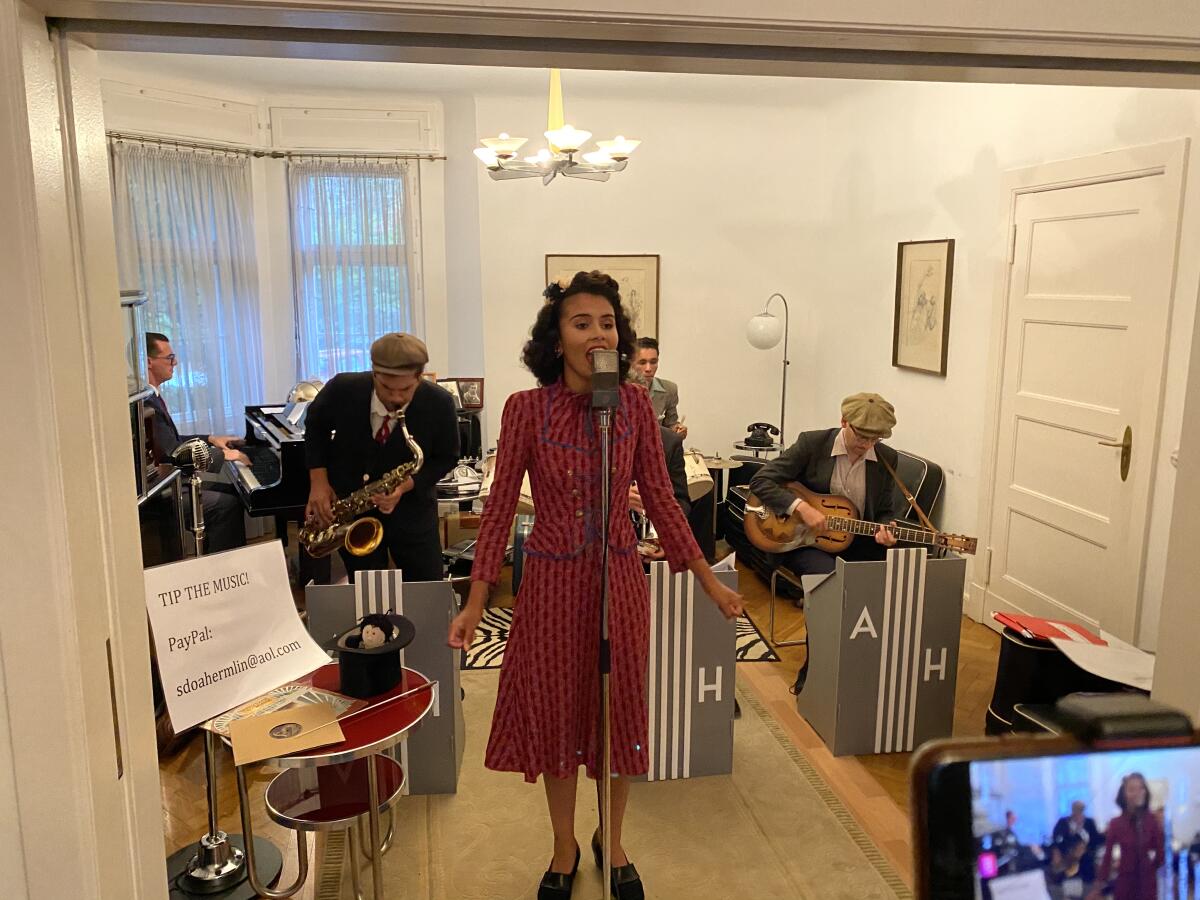
Marcus, a 42-year-old bike repairman who declined to give his last name for fear that dancing with others in front of the stage was still verboten according to social-distancing regulations, agreed that the Swingin’ Hermlins and their music were special.
“They’re the best swing band in Berlin and probably in all of Germany, and the level they’re playing at is not something you usually find on the streets or in the park,” he said.
Listeners tapped their feet or slapped their thighs. Dozens of couples expertly twirled their way through the Jitterbug, Lindy Hop, West Coast Swing and other dance styles.
“Your legs just won’t stay still when this music starts,” said office worker Mika Schrader, 49, as Rachel Hermlin and the band struck up an impressive cover of Ella Fitzgerald’s “A-Tisket, A-Tasket.”
Andrej Hermlin sat at the piano, as usual. But this time, under the blue skies and in front of an appreciative live audience once again, there was no sign of any tears — only smiles.
“That never happened to me ever before in 30 years on stage,” Hermlin said of his crying jag while performing in March. “But I couldn’t control myself. I thought it was all over. But as you can see, we’re not giving up. Music is hope. That’s why we’re not going to stop playing.”
Kirschbaum is a special correspondent.
More to Read
Sign up for Essential California
The most important California stories and recommendations in your inbox every morning.
You may occasionally receive promotional content from the Los Angeles Times.













